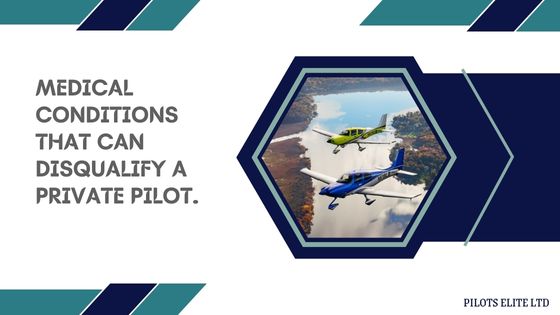Quick notes on Private Pilot License Medical Disqualifications.

Private pilot license (PPL) medical disqualifications are conditions that prevent individuals from obtaining or maintaining a PPL for safety reasons.
Aspiring pilots must undergo a thorough medical examination by an Aviation Medical Examiner (AME) to assess their fitness for flying.
If a disqualifying condition is identified, treatment or further evaluation may be necessary before reapplying for the PPL.
These disqualifications prioritize aviation safety and ensure the pilots are physically and mentally capable of responsibly operating an aircraft.
Common medical conditions or factors could disqualify someone from obtaining or maintaining a PPL.
Cardiovascular Conditions.
Individuals with cardiovascular conditions such as severe heart disease, myocardial infarction (heart attack), coronary artery disease, or conditions that require ongoing use of anti-arrhythmic medications may be considered incompetent to become a private pilot.
On the other hand, the FAA has specific guidelines regarding cardiovascular health and the use of medications specific to pilots.
Neurological Conditions.
Conditions such as seizure disorders, epilepsy, or situations that may cause loss of consciousness or impairment of cognitive functions disqualify anyone from obtaining an aviation medical certificate.
Following the FAA’s specific guidelines on seizure history and using anticonvulsant medications is essential.
Vision Problems.
Severe vision impairments that cannot be adequately corrected with glasses or contact lenses may be disqualifying. The FAA outlines specific visual acuity and color vision requirements.
Mental Health Conditions.
Mental health conditions that impair a pilot’s ability to operate an aircraft safely are disqualifying.
For instance, a person with severe depression, bipolar disorder, or psychosis is not eligible to get a private pilot license.
However, not all mental health conditions automatically disqualify an individual, and the FAA considers each case individually.
Substance Abuse or Dependence.
A history of substance abuse and addiction to alcohol or drugs disqualifies one from obtaining a PPL.
The FAA requires a period of abstinence and evidence of rehabilitation before granting medical certification.
Certain Medications.
The FAA has specific guidelines on the use of medications. Some medications, such as certain antidepressants or anticoagulants, may require careful evaluation to determine their impact on pilot performance.
These are just a few examples, and other medical conditions or factors could disqualify someone from obtaining or maintaining a PPL.
It is essential to consult with an AME familiar with the FAA’s medical certification standards so that pilots can get accurate and up-to-date information regarding their specific situation.
Special Issuance or Waivers.
Sometimes, the FAA may grant a special issuance or waiver for individuals seeking a PPL in the United States with specific medical conditions.
A special issuance is a medical certification issued on a case-by-case basis, allowing an individual to fly in particular situations that would otherwise be disqualifying. Here are a few examples:
Special Issuance for Cardiovascular Conditions.
By cardiovascular conditions, I am implying a record of heart surgery, coronary artery diseases, or taking certain cardiac-prescribed drugs.
In that case, the FAA may grant a special issuance of a medical certificate after a comprehensive evaluation by an AME and submission of relevant medical documentation.
Special Issuance for Neurological Conditions.
The FAA would observe the applicant’s current condition if an aspiring pilot has a history of seizures, epilepsy, or certain neurological disorders.
After proper examination, if the applicant proves to be in stable condition, receiving appropriate treatment and a seizure-free period, then the applicant is eligible for a special issuance.
Special Issuance for Mental Health Conditions.
Some mental health conditions, like an experience of depression, bipolar disorder, or anxiety disorders, might be taken into account for special consideration.
Suppose an individual can prove that their mental health is stable due to special treatment after proper evaluation by a qualified mental health professional. In that case, the individual can receive a special issuance.
Special Issuance for Vision Impairments.
Suppose an applicant has a vision impairment that does not meet the standard visual acuity requirements. In that case, they may be eligible for a special issuance if they can demonstrate functional vision through a comprehensive evaluation by an eye specialist.
Special Issuance for Medication Usage.
In some cases, the FAA grants a special issuance for individuals taking certain medications that are usually considered disqualifying.
The FAA evaluates the specific drug, dosage, and the individual’s response to the medication.
The crucial element the FAA scrutinizes is whether granting a special issuance/waiver is the individual’s ability to operate an aircraft safely.
If the person’s medical condition and treatment jeopardize safe aircraft operation, the FAA will not issue a special waiver.
The FAA will require a thorough evaluation of the medical condition, often including specialist consultations and medical records, to determine eligibility.
To pursue a special issuance or waiver, it is recommended to consult with an AME who can guide you through the process and provide accurate information based on your specific medical situation.
The AME can assist you in getting the necessary documentation and submitting it to the FAA for evaluation.
Discover the critical medical disqualifications for private pilot licenses—eligibility factors to make informed decisions for flight training.
